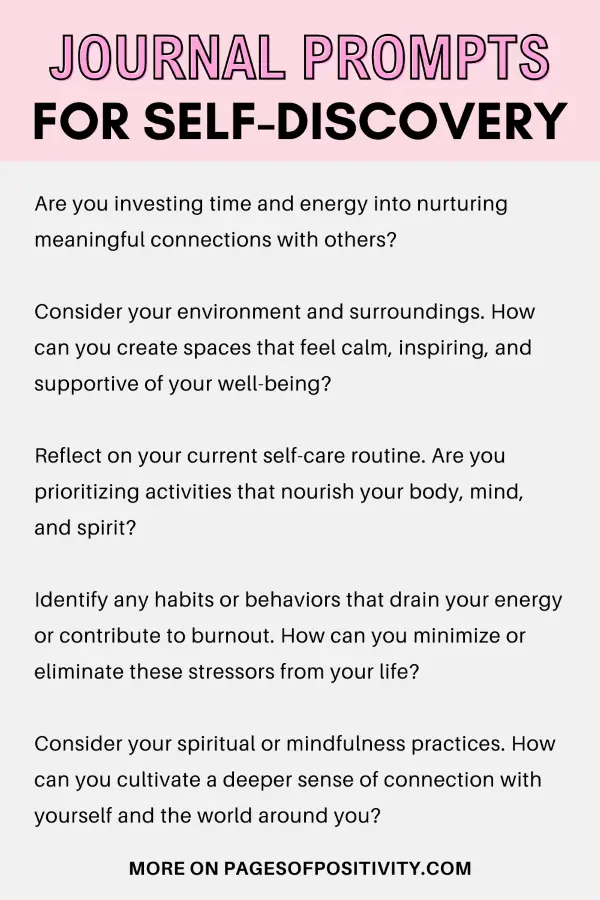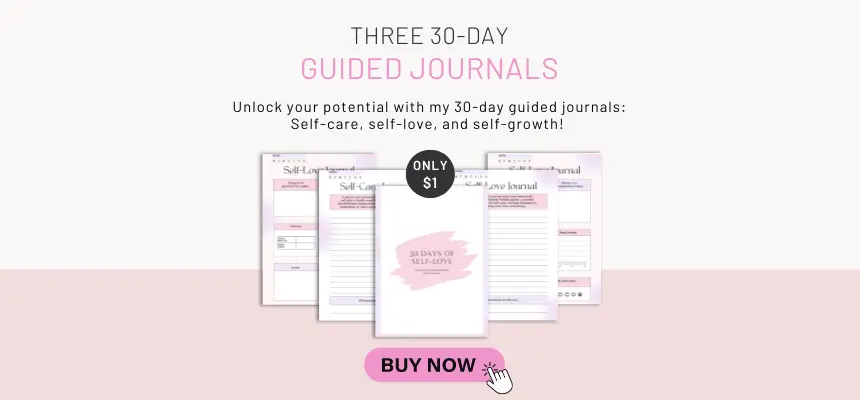A list of the best self-discovery journal prompts
I’m excited to share some of my favorite journal prompts for self-discovery that have helped me navigate the winding paths of my own journey.
Have you ever had one of those moments where you just pause and wonder, “Who am I really?” Well, you’re not alone!
We all crave a deeper understanding of ourselves, and journaling can be the key to unlocking that self-discovery journey.
Whether you’re embarking on a quest for personal growth or simply seeking clarity in your life, journal prompts can be incredibly powerful tools to spark introspection and reflection.


This post may contain affiliate links. That is, if you click on a link and buy something I recommend, I will receive a small compensation at no additional cost to you.
Self-discovery journal prompts for self-reflection
- What are your core values, and how do they influence your decisions and actions?
- Reflect on a time when you felt most alive and fulfilled. What were you doing, and why did it resonate with you?
- Describe your ideal day from start to finish. What activities, people, and surroundings are involved?
- Think about a challenging situation you’ve overcome. How did it shape you, and what did you learn from it?
- What are your strengths, and how can you leverage them to enhance your life and relationships?
- Describe the type of person you aspire to become. What characteristics do they possess, and how can you cultivate them?
- Reflect on your childhood dreams and passions. Are there any you’ve neglected but still hold significance for you?
- What fears or limiting beliefs are holding you back from reaching your full potential? How can you overcome them?
- Explore your relationship with failure. How do you typically respond to setbacks, and how can you reframe them as learning opportunities?
- Consider the people who inspire you. What qualities do they have that resonate with you, and how can you embody those qualities?
You might also like: These personal growth journal prompts will change your life

- Reflect on your happiest memories. What patterns or themes do you notice, and how can you incorporate more of those elements into your life?
- Write a letter to your future self, expressing your hopes, dreams, and intentions.
- What activities or hobbies make you lose track of time? How can you prioritize incorporating more of them into your life?
- Reflect on your past relationships. What recurring patterns or lessons have you observed, and how can you apply them moving forward?
- Consider your role models or mentors. What specific qualities or achievements do you admire in them, and how can you emulate them in your own life?
- What are your most deeply held beliefs about life, love, success, and happiness? How do these beliefs shape your worldview and actions?
- Reflect on a recent challenge or obstacle. What did it teach you about yourself, and how can you use that insight to grow?
- Consider the environments in which you thrive. What conditions or settings help you feel most inspired and motivated?
- Reflect on your proudest achievements. What obstacles did you overcome to reach them, and how did they shape your journey?
- Imagine your life five years from now. What goals have you accomplished, and what steps can you take today to move closer to that vision?

Goal-setting journal prompts for self-discovery
- Reflect on your long-term aspirations in various areas of your life, such as career, relationships, health, and personal growth. What specific goals can you set to move closer to these aspirations?
- Identify one major goal you want to achieve in the next year. What steps can you take to break it down into smaller, manageable tasks?
- Consider your strengths and weaknesses. How can you leverage your strengths to achieve your goals, and what strategies can you implement to overcome potential obstacles?
- Reflect on past goals you’ve set. What factors contributed to your success or failure in achieving them, and how can you apply those lessons to your future goal-setting process?
- Visualize your ideal future self, having achieved your goals and aspirations. What habits, behaviors, and mindset shifts can you adopt to align more closely with that vision?
- Consider the SMART criteria (Specific, Measurable, Achievable, Relevant, Time-bound) when setting goals. How can you apply each of these principles to make your goals more effective and achievable?
- Reflect on your core values and priorities. How can you ensure that your goals align with these values, and how will achieving them contribute to your overall fulfillment and happiness?
- Identify any limiting beliefs or self-doubts that may be holding you back from setting ambitious goals. How can you reframe these beliefs and cultivate a more empowering mindset?
- Break down your goals into short-term, medium-term, and long-term objectives. What actions can you take each day, week, and month to progress towards your desired outcomes?
- What are the most important goals that you have achieved during the last three years?
You might also like: These fun journal prompts will unleash your imagination

- Reflect on the potential obstacles or setbacks you may encounter along the way. How can you develop resilience and adaptability to overcome these challenges and stay on track?
- Set aside time regularly to review and reassess your goals. Are there any adjustments or refinements you need to make to ensure they remain relevant and achievable?
- Consider the potential risks and rewards associated with each of your goals. How can you mitigate risks while maximizing the likelihood of success?
- Reflect on the intrinsic and extrinsic motivations driving your goal-setting process. How can you cultivate a balance between external validation and internal fulfillment?
- Visualize the emotional and psychological benefits of achieving your goals. How will your life be different, and how can you use that vision to fuel your motivation and determination?
- Consider the resources and support systems available to you. How can you leverage these resources to accelerate your progress and overcome obstacles more effectively?
- Reflect on your past successes and accomplishments. How can you use these experiences as evidence of your capabilities and confidence in pursuing future goals?
- Identify any potential distractions or time-wasters that may derail your progress towards your goals. How can you minimize or eliminate these distractions to stay focused and productive?
- Celebrate small victories and milestones along the way. How can you acknowledge your progress and reinforce positive habits to maintain momentum towards your goals?
- Reflect on the legacy you want to leave behind. How can your goals contribute to a sense of purpose and fulfillment that extends beyond your individual achievements?

Journal prompts to improve yourself
- Reflect on your recent successes and accomplishments. What specific actions or strategies contributed to your achievements, and how can you replicate or build upon them in the future?
- Consider your current habits and routines. Which ones are serving you well, and which ones are hindering your progress or well-being?
- Identify one area of personal growth or skill development that you want to focus on. What steps can you take to cultivate expertise or proficiency in that area?
- Reflect on your communication style and interpersonal skills. How can you improve your ability to express yourself clearly and empathetically, both verbally and nonverbally?
- Consider your relationship with failure and adversity. How can you reframe setbacks as opportunities for learning and growth, rather than sources of frustration or defeat?
- Reflect on your self-care practices. Are you prioritizing your physical, mental, and emotional well-being effectively? What adjustments can you make to ensure you’re nurturing yourself holistically?
- Identify any negative self-talk or limiting beliefs that may be undermining your confidence or self-esteem. How can you cultivate a more compassionate and empowering inner dialogue?
- Reflect on your time management and productivity habits. How can you optimize your workflow and minimize distractions to maximize your efficiency and effectiveness?
- Consider your approach to problem-solving and decision-making. Are you relying on logical analysis, intuition, or a combination of both? How can you enhance your decision-making skills?
- Reflect on your strengths and weaknesses. How can you leverage your strengths to overcome your weaknesses or compensate for areas where you may be less proficient?
You might also like: You'll love these gratitude journal prompts, for sure
- Consider seeking feedback from trusted friends, family members, or colleagues. What insights can you gain from their perspectives, and how can you use that feedback to improve yourself?
- Reflect on your creativity and innovation. How can you cultivate a mindset of curiosity and experimentation to generate new ideas and solutions?
- Consider your resilience and adaptability in the face of change or uncertainty. How can you cultivate a growth mindset that embraces challenges as opportunities for growth?
- Reflect on your emotional intelligence and self-awareness. How can you deepen your understanding of your own emotions and those of others to enhance your relationships and communication skills?
- Consider your learning style and preferences. How can you tailor your approach to acquiring new knowledge or skills to align with your strengths and interests?
- Reflect on your values and priorities. Are you living in alignment with what matters most to you? What adjustments can you make to ensure your actions reflect your core values?
- Identify any habits or behaviors that no longer serve you. How can you release or replace these habits with more constructive alternatives?
- Reflect on your resilience and adaptability in the face of change or uncertainty. How can you cultivate a growth mindset that embraces challenges as opportunities for growth?
- Consider your role in your community or social networks. How can you contribute positively to the lives of others and foster a sense of connection and belonging?
- Reflect on your overall sense of fulfillment and happiness. What brings you joy and fulfillment, and how can you prioritize those aspects of your life more intentionally?

Self-care and self-love journal prompts
- Reflect on your current self-care routine. Are you prioritizing activities that nourish your body, mind, and spirit?
- Identify your favorite ways to relax and unwind. How can you incorporate more of these activities into your daily or weekly schedule?
- Reflect on your relationship with yourself. How can you cultivate greater self-compassion and acceptance, embracing all aspects of who you are?
- Consider your boundaries and limits. Are you honoring your needs and saying no when necessary to protect your well-being?
- Reflect on your sleep habits and quality. How can you prioritize getting enough restful sleep to support your overall health and vitality?
- Identify any negative self-talk or self-criticism. How can you reframe these thoughts with more loving and supportive language?
- Reflect on your nutrition and hydration. Are you fueling your body with nourishing foods and staying hydrated throughout the day?
- Consider your relationship with technology and screen time. How can you establish healthier boundaries to prevent digital overwhelm and promote mindfulness?
- Reflect on your physical activity and movement. How can you incorporate more joyful movement into your daily routine to boost your mood and energy levels?
- Identify activities or hobbies that bring you joy and fulfillment. How can you prioritize making time for these activities regularly?
You might also like: I highly suggest you try these January writing prompts next year

- Reflect on your social connections and relationships. Are you investing time and energy into nurturing meaningful connections with others?
- Consider your environment and surroundings. How can you create spaces that feel calm, inspiring, and supportive of your well-being?
- Reflect on your stress-management techniques. What strategies help you cope with stress and maintain a sense of balance and resilience?
- Identify any habits or behaviors that drain your energy or contribute to burnout. How can you minimize or eliminate these stressors from your life?
- Consider your spiritual or mindfulness practices. How can you cultivate a deeper sense of connection with yourself and the world around you?
- Reflect on your self-expression and creativity. How can you honor your unique talents and interests, allowing yourself to fully express who you are?
- Identify any areas of your life where you feel out of alignment or disconnected. How can you bring more balance and harmony to those areas?
- Reflect on your personal boundaries and assertiveness. How can you communicate your needs and desires with clarity and confidence?
- Consider your self-care as a form of self-love and self-respect. How can you prioritize your well-being as an essential aspect of honoring yourself?
- Reflect on your progress and growth in your self-care journey. What positive changes have you noticed, and how can you continue to support yourself with love and compassion?

Career-related journal prompts for self-discovery
- Reflect on your career aspirations and goals. What do you envision for your professional future, and how can you work towards those goals?
- Identify your strengths and skills that you bring to the workplace. How can you leverage these assets to advance in your career?
- Consider your values and priorities in your career. Are they aligned with your current job or industry, and if not, how can you make adjustments?
- Reflect on your past career experiences. What have been your most significant achievements and challenges, and what have you learned from them?
- Identify any areas of professional development or skill improvement that you want to focus on. How can you pursue opportunities for growth in these areas?
- Reflect on your ideal work environment and culture. What conditions and values are most important to you in the workplace?
- Consider your relationship with work-life balance. Are you prioritizing your personal well-being and fulfillment outside of work?
- Reflect on your current job satisfaction. What aspects of your job do you enjoy the most, and what areas do you find most challenging or unfulfilling?
- Identify any career-related fears or doubts that may be holding you back from pursuing your goals. How can you overcome these obstacles and move forward with confidence?
- Reflect on your leadership style and abilities. How can you continue to develop your leadership skills and influence within your organization or field?

- Consider your network and professional relationships. Are you actively nurturing connections with mentors, colleagues, and industry peers?
- Reflect on your long-term career vision. What steps can you take today to align your actions with that vision and move closer to your desired outcomes?
- Identify any areas of expertise or specialization that you want to develop further in your career. How can you gain the necessary skills and knowledge in these areas?
- Reflect on your communication and interpersonal skills. How can you enhance your ability to collaborate effectively with others and navigate workplace dynamics?
- Consider your approach to problem-solving and decision-making in your career. How can you refine your critical thinking skills and strategic thinking abilities?
- Reflect on your personal brand and professional reputation. How can you cultivate a positive image and presence within your industry or field?
- Identify any areas of your job or career that you find uninspiring or unfulfilling. How can you inject more passion and purpose into your work?
- Reflect on your career trajectory and goals. Are you on track to achieve your desired level of success and fulfillment, or do you need to make adjustments?
- Consider your attitude and mindset towards your career. How can you cultivate a growth mindset and embrace challenges as opportunities for learning and growth?
- Reflect on your overall satisfaction and fulfillment in your career. What changes or improvements can you make to ensure that your work aligns with your values and aspirations?

What are self-discovery journal prompts, and why should I journal?
Journal prompts for self-discovery are thought-provoking questions or statements designed to encourage introspection, reflection, and exploration of yourself.
These self-discovery writing prompts can cover a wide range of topics, including personal values, beliefs, experiences, goals, strengths, weaknesses, and aspirations.
They serve as a catalyst for self-awareness and understanding, helping people gain insight into their thoughts, feelings, behaviors, and motivations.
Self-reflection
Journaling provides a dedicated space for introspection, allowing you to explore your thoughts, emotions, and experiences in depth.
Clarity
Writing can help clarify your thoughts and feelings, making complex or confusing issues easier to understand and process.
Insight
Regular journaling can uncover patterns, themes, and insights about yourself that may not be apparent in everyday life. It can help you identify strengths, weaknesses, and areas for growth.
Problem-solving
Journaling can be a valuable problem-solving tool, allowing you to brainstorm solutions, weigh pros and cons, and gain perspective on challenges you may be facing.
Emotional release
Writing about your emotions can provide catharsis and emotional release, reducing stress and promoting mental well-being.
Goal-setting
Journaling can help you clarify your goals, break them down into actionable steps, and track your progress over time.
Self-awareness
By regularly reflecting on your thoughts, feelings, and behaviors, you can develop a deeper understanding of yourself and become more self-aware.
What are your favorite journal prompts for self-discovery?

I consider myself an expert when it comes to positive affirmations, journaling, and inspirational quotes. My blog is all about spreading good vibes and helping you feel awesome! I’ve got loads of cool stuff for you to explore, like uplifting affirmations that can boost your confidence, fun journal prompts to spark your creativity, and inspiring quotes to motivate you every day. Let’s embark on this amazing journey together as we discover more about ourselves, uncover our hidden strengths, and create a life that’s full of happiness and success.







